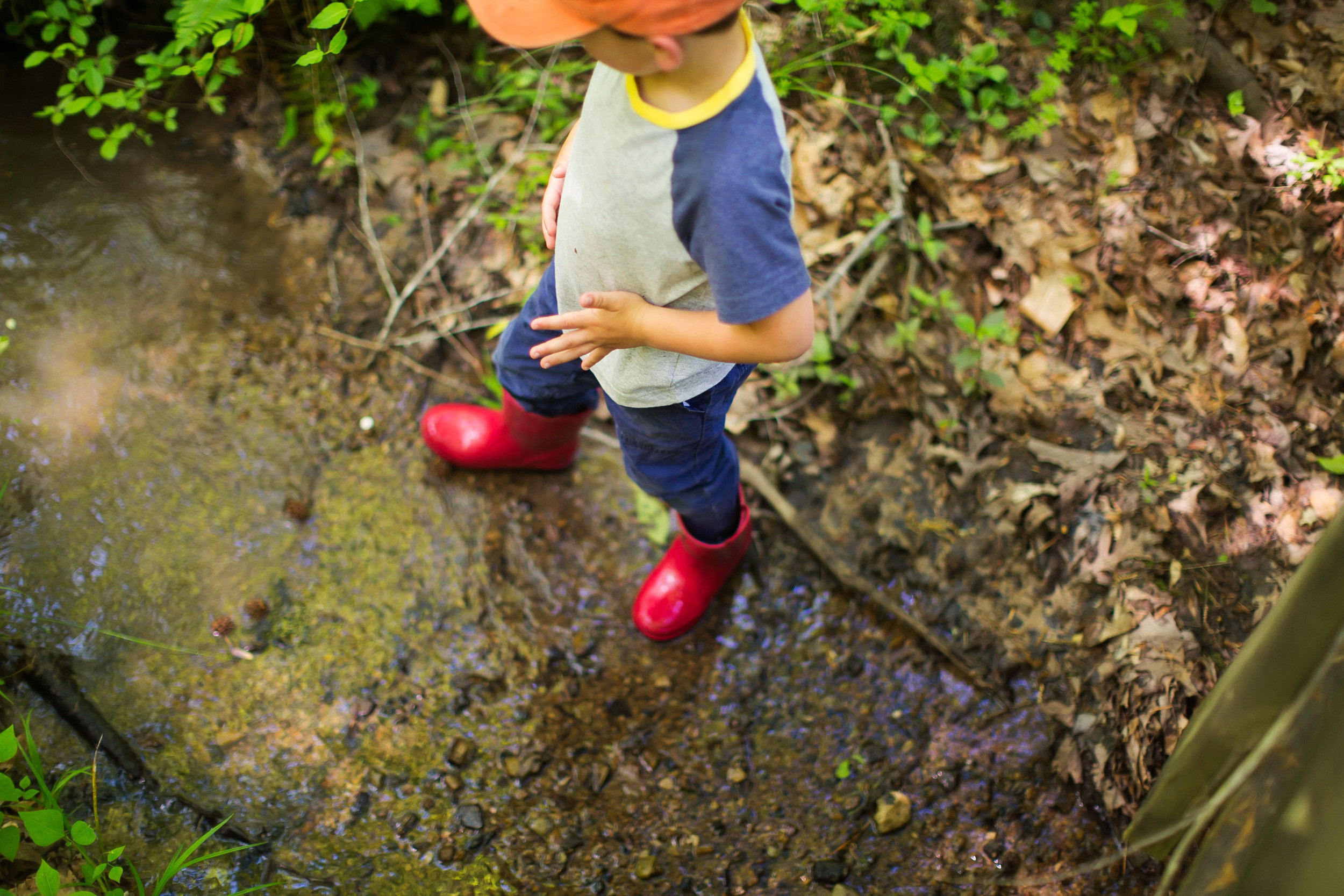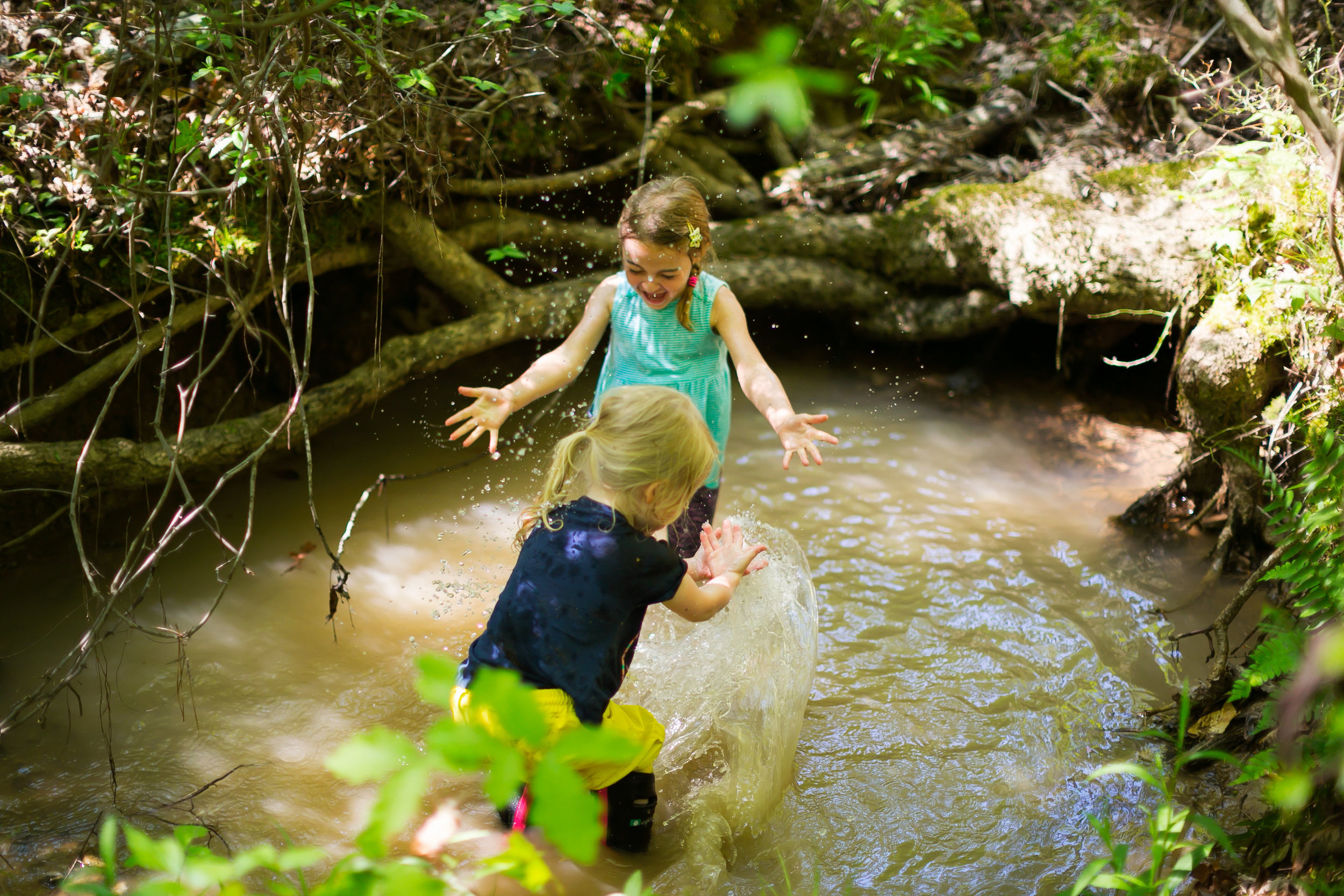Why is Forest School Unique?
Forest Kindergarten
Friedrich Frobel, a German educator, opened the world's first kindergartens (German for "children's gardens") more than 150 years ago. He believed that young children should spend their time playing in nature and less emphasis should be placed on learning letters and numbers. Today, across Europe, thousands of these outdoor "forest kindergartens" have been established. Children spend their entire class time exploring and learning outdoors year-round.
"The Forest Kindergarten model, through its interest-led programming, inquiry-based teaching style and emphasis on social and emotional development promotes kindergarten readiness in the following ways: it leads to better problem solving; higher critical thinking; encourages excitement about learning and retains the desire to learn; it teaches kids HOW to problem solve not WHAT the answers are; it expands creativity; it promotes a willingness to take risks; and it results in children who have better peer communication, emotional resilience, lower frustration levels, higher perseverance, and who work more cooperatively with their class mates."
-Erin Kenny, Founder of one of the first Forest Schools in the United States
What are the advantages of Forest school education?
EXPLORATION
Woodsong’s early childhood curriculum is rooted in play-based learning. The children are free to explore and experiment in nature. In this way, the focus is on cultivating and growing the process of learning, not on content. While children are discovering nature they will be encouraged to assimilate new information and problem solve through divergent thinking.
CREATIVITY
At Woodsong, children are surrounded by an expansive landscape. The height of the tall trees, the broad beautiful view of the lake, the journey to our classroom site, and playing in the midst of growing and changing things, all help students to reach beyond themselves to embrace out of the box thinking. Immersing children in the creativity of the natural world inspires them to become imaginative artists themselves.
According to a study carried out by the National Wildlife Federation, students who spend regular time in unstructured outdoor play are more creative, better problem solvers, and better able to concentrate. Studies confirm access to nature in an educational setting has a positive impact on student focus and learning by improving attentiveness, future test scores and performance.
ADVENTURE
We believe that childhood is a season of life that should be filled with adventure, and the source of that adventure should be the natural world. Woodsong’s students are fully immersed in the new, unusual, and exciting experiences that nature has to offer. The children are outside the entire time they are in forest school, resulting in an intimate, deep and personal connection to the natural world.
“To be fully human is to recognize that we came from the natural world and it remains a part of us, without it, being fully human is something we cannot do.”
“Look deep into nature, and then you will understand everything better.”
DISCOVERY
Involvement in unstructured nature play stimulates a child’s drive for exploration and discovery. This motivates the child to gain mastery over their environment, promoting focus and concentration. It also enables the child to engage in the flexible and higher-level thinking processes deemed essential for the 21st century learner. These include inquiry processes of problem solving, analyzing, evaluating, applying knowledge and creativity.
ENGAGEMENT
Our teachers are trained to step back and attentively follow the child’s lead. Woodsong’s curriculum is interest-led, child driven Flow Learning. As children move through nature, they become interested in something, such as a bird or a frog, a flower or a puddle. As the children interact with the subject of interest, the teacher steps into the learning opportunity to impart naturalist knowledge, integrate a mini science lesson, or seize the moment to infuse mathematics or literacy learning.
“In my experience, when children are truly interested, they can be very focused and retain information at an astonishing rate.”
“Everybody needs beauty as well as bread, places to play in and pray in, where nature may heal and give strength to body and soul alike.”
CURIOSITY
When children play and explore nature, they naturally ask many questions. At Woodsong, we value inquiry as an important catalyst for the development of positive attitudes toward learning. These include imagination, wonder, curiosity, enthusiasm, and persistence. The type of learning processes and skills fostered in play cannot be replicated through rote learning, where there is an emphasis on remembering facts.
STRENGTH
When children spend time immersed in nature, they are physically healthier. Studies have shown that playing in nature makes children more physically fit and strengthens their immune systems. Children immersed in nature practice their gross and fine motor skills continuously. In doing so, they can discover their physical capabilities and their boundaries, learn to recognize risk, and learn to keep their balance. Resilience and risk assessment are two important components for the development and success of people as they age, and both are cultivated positively in the forest school setting.
“Our task must be to free ourselves by widening our circle of compassion to embrace all living creatures and the whole of nature and its beauty.”
“God’s dream is that you and I and all of us will realize that we are family, that we are made for togetherness, for goodness, and for compassion.”
BELONGING
A young child’s sense of place and belonging derives from their direct interactions with their immediate community, whether that is people, places, or the flora and fauna around them. Woodsong Forest School’s children develop a great sense of belonging from their intimate connection with their immediate surroundings in the natural world. Children move through the same spaces in different seasons and can observe a favorite plant or place in the forest change and yet remain the same. These children feel very much rooted in their sense of place.
COMPASSION
Everywhere we look, we can see that the world is in need of more compassion. Children at Woodsong learn respect and value for all living beings, and are empowered to grow in empathy. They are taught to be kind to nature, to be kind to one another, and to be kind to themselves.
COLLABORATION
When children are engaging in unstructured imaginative play, they are discovering the fine art of socialization: negotiation, compromise, cooperation and teamwork. Woodsong offers children the opportunity to observe the interconnectedness of all living things and the unique way that teamwork is exemplified as creatures interact in the natural world.
CONNECTION
When children are immersed in the natural world, it gives them time to be quiet and still, something that is a rarity in the busyness of our modern lives. This provides the child with the opportunity to reset their internal frenetic pace and experience a deep sense of calm. In turn, forest school children have the time and space to connect to and grow in their sense of wonder and love for the natural world. This affinity for nature plants a powerful seed within children for life-long environmental stewardship.













